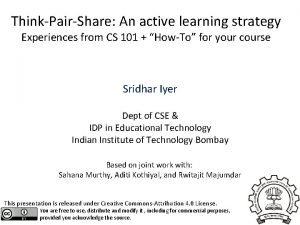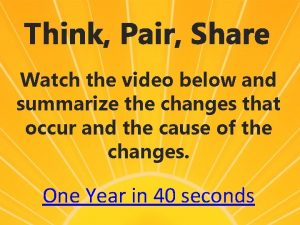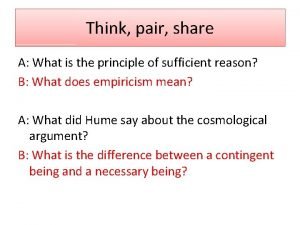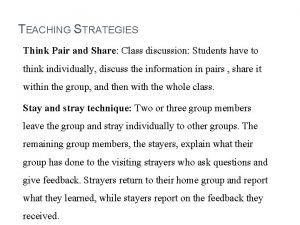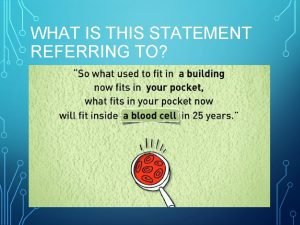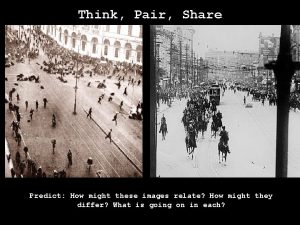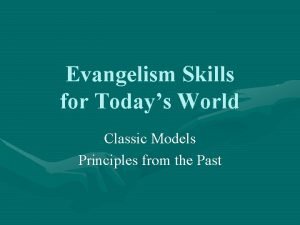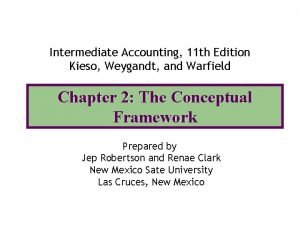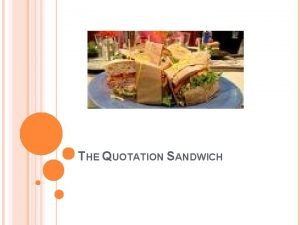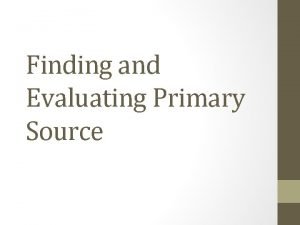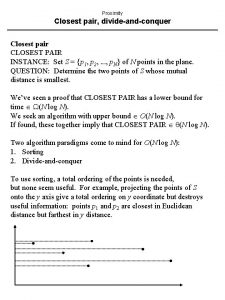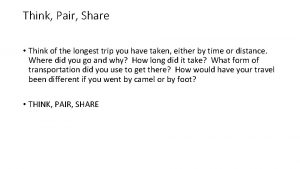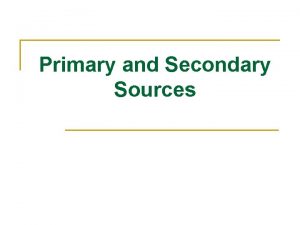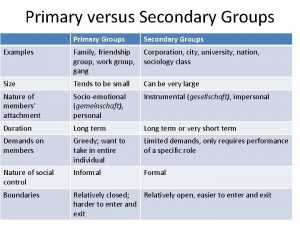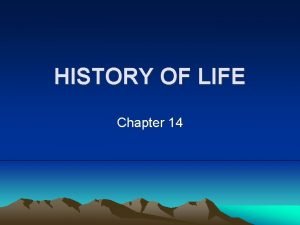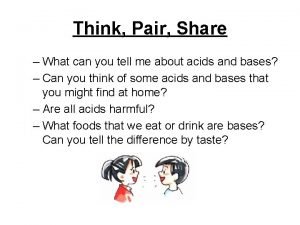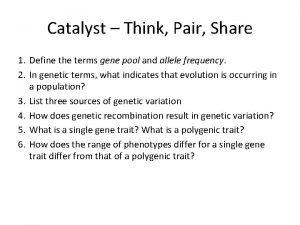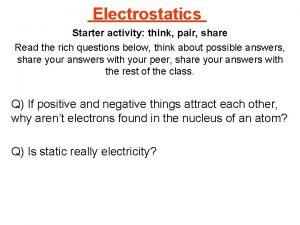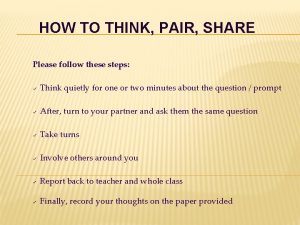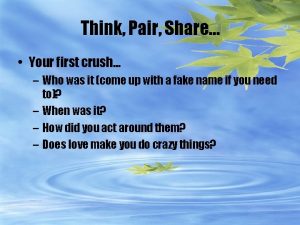Think Pair Share Primary Secondary Qualities Outline the

























- Slides: 25

Think / Pair / Share - Primary + Secondary Qualities Outline the key differences between Primary and Secondary qualities as defined by John Locke (5 marks). Primary Qualities are properties of an object that exist in the object itself. They are measurable mathematically or geometrically, they are essential to the object and are accessible to more than one sense. Secondary Qualities are produced by an object due to it’s particular makeup / order of primary qualities and are mind-dependent. They are not present in the object itself and may differ from perceiver to perceiver. Avoid: Redundancy – Too much irrelevant information, repetition, examples that don’t add anything to your answer, confusing key terms.

Indirect Realism Weaknesses 1 Lesson Objective: • Examine how Indirect Realists may respond to scepticism about the nature of the external world. • Discuss some of the criticisms of these responses.

Illusion Perceptual Variation Hallucination Time-Lag

Illusion Perceptual Variation Hallucination Time-Lag

IDR Problems What we have been developing is a ‘two-world’ view of perception. World Number One – The world as it really is. Here, objects with primary qualities happily obey the laws of physics in their colourless, soundless, tasteless and odour-free world. It is this world, in conjunction with our minds that allows us to perceive… World Number Two – The colourful, smelly, tasty world of our everyday experience. World number two contains our perception of both primary and secondary qualities and while the latter might not resemble what causes them, our perception of primary qualities give us a fairly accurate picture of reality. What was the issue we highlighted with this way of thinking last lesson?

IDR Problems 1 – The Nature of Mind-Independent Objects If I cannot have immediate access to reality (world number one) then how can I be sure that anything I am perceiving (world number two) matches up with reality in any way? If we can never perceive an object directly, how can we be sure it has any of the qualities we perceive it to have? This extends to primary qualities as well as secondary qualities.

IDR Problems 1 This issue is usually summarised as: “Scepticism about the nature of mind-independent objects. ” Scepticism – Doubting something that we may usually claim to know. Often used in Philosophy as a method of testing the validity of knowledge claims.

Veil of Perception One common analogy used to describe this gap between our sensory experience and the external ‘real’ world is the veil of perception. It is though a veil has been dropped down between us and the world, meaning we only ever have access to our representations (the world as we see it through the veil) and cannot peer beyond to reality. Add this image to your notes with an explanation of the problem it presents…

IDR Problems 1 - Responses This issue is usually summarised as: “Scepticism about the nature of mind-independent objects. ” Crucially therefore, any responses / replies to this issue must attempt to show why we can know things about the way external objects are. Remember – Many IDR’s do not argue that we can know the full nature of physical objects, so our response can be limited to simply bridging the gap between perception and the external world.

Responses 1: Locke – Think / Pair / Share What does Locke think we can know for sure about external objects? Do you think he is correct? Why might some philosophers disagree?

Responses 1: Locke As we’ve stated before, Locke is of the opinion that whilst we may not be able to know all an objects real properties, we can know some: It’s primary properties. The issue here is whether this is necessarily the case – is it possible that we could be wrong about primary properties as we have been about secondary ones? Is it possible that an object may not have the size / shape / motion we think it has?

Responses 2: Russell - Whiteboards Think back to your homework from last lesson – what did Russell think our perceptions can tell us about the world?

Responses 2: Russell believed that the organisation and order of objects in our perceptions must correspond with the way they are in reality. He thought it was just obvious this would be the case as it’s backed up by multiple perceptual sources. He was also of the opinion that sense data could tell us about the ‘relations’ between objects: “If one object looks blue and another red, we may reasonably presume that there is some corresponding difference between the physical objects; if two objects both look blue, we may presume a corresponding similarity. But we cannot hope to be acquainted directly with the quality in the physical object which makes it look blue or red. ”

Responses 2: Russell But is Russell correct here? Why must we assume that the differences we perceive objects as having in our sense data correspond to real differences in the physical world? Is it not possible that our perception of the world could be entirely corrupt and the differences we perceive objects as having are completely mind-dependent?

IDR Problems – Philosophical References Ultimately for both Russell and Locke this problem is not something that can be answered conclusively. They are both committed to the view that all knowledge of the world can only come to us through our senses, and this therefore precludes any true knowledge of the external / physical world independent of these senses. David Hume (important name) also highlights this point: “The mind never has anything present to it but the perceptions, and can’t possibly experience their connection with objects. The belief in such a connection, therefore, has no foundation in reasoning because the reasoning would have to start from something known through experience. ”

Task 1. Summarise the responses given by Locke and Russell to the question of whether we can know anything about the nature of the external world. 2. Explain whether or not you think these responses are adequate and why. (Use page 69 in the textbook to help you). 3. Read through the other responses to the scepticism issue on page 71 and add them to your notes, along with their criticisms. 4. Extension: If you complete these tasks, collect an extension sheet from the back of the room and choose a task to complete.

Responses 3: Survival A third response to this issue might be to suggest that if the world as we see it did not match our perceptions in some way we would not survive. We would be unable to hunt and catch animals, find the nuts and berries needed to nourish ourselves and our species would have died out long ago. We have survived, so our perception of the world must be fairly accurate. Is this a particularly convincing argument though?

Responses 2: Survival Is this a particularly convincing argument though? • Not really, as long as our senses work systematically (that is to say they show the same thing each time they encounter a particular characteristic of the real world) our perception could be nothing like reality and we could still survive. • Maybe our senses are rigged to help us survive but in the process are distorting reality completely. After all, different animals perceive the world in many different ways, and they survive fine.

Responses 4: Common Perception Maybe we can say we know what we are perceiving matches reality because we all see it. That it say we could appeal to the testimony of others. If everyone sees the world roughly the same way I do, then I have some evidence the world is how it appears. Is this a particularly convincing argument?

Issues Summary It seems then that the nature of reality is a big issue for Indirect Realists, but does this defeat theory as a whole?

Scepticism =/= IDR Falsity Just because we may be sceptical about the nature of the external world does NOT mean that IDR is automatically false… this is a particularly idea many If. But Indirect Realism is just thehard belief thatfor “what we philosophers to accept, it means perceive is mind-dependent sense dataadmitting that stemsthat from there is a realityobjects”, independent ofcould our senses but mind-independent then we accept never accepting that weabout will never truly and know anything knowing anything said objects it would not that reality. meanabout indirect realism is false. As long as the ‘two-world’ idea we mentioned earlier in the lesson is the case, issue the physical could benext Which leads us to the we will world be covering nothing like our sense lesson… data and IDR would still be true.

Key Question Explain why indirect realism may lead to scepticism about the nature of the external world, and one potential response to this problem (12 marks).

Key Question Explain why indirect realism may lead to scepticism about the nature of the external world, and one potential response to this problem (12 marks).

Homework – Website Task “Given what we’ve covered over the last few lessons, do you think it’s possible for us to know anything about the external world? ” Due: By next lesson

Lesson Summary Lesson Objective: • Examine how Indirect Realists may respond to scepticism about the nature of the external world. • Discuss some of the criticisms of these responses.
 Infant development
Infant development Kagan math strategies
Kagan math strategies Think pair share method
Think pair share method Thevideo pair
Thevideo pair Think pair share poster
Think pair share poster Think pair share cooperative learning
Think pair share cooperative learning What are think-pair-share debates?
What are think-pair-share debates? Think pair share definition
Think pair share definition Think-pair-share advantages and disadvantages
Think-pair-share advantages and disadvantages Think pair share examples
Think pair share examples Think pair and share page 119-120
Think pair and share page 119-120 Think pair share
Think pair share Think pair share images
Think pair share images Ramaniklal ambani
Ramaniklal ambani Alir locke
Alir locke Stand up handup pair up kagan
Stand up handup pair up kagan Mix pair share kagan
Mix pair share kagan Ordered pair and unordered pair
Ordered pair and unordered pair Dof of screw pair
Dof of screw pair 3 bucket system
3 bucket system Share jesus without fear outline
Share jesus without fear outline Intermediate accounting kieso
Intermediate accounting kieso Robin and jay poem
Robin and jay poem Think fam think
Think fam think Quotation sandwhich
Quotation sandwhich Primary source outline
Primary source outline


